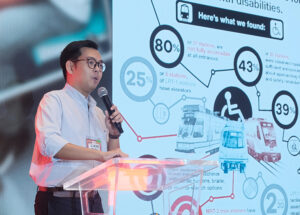The Department of Transportation (DoTr) is readying a directive that will allow the co-designing of a public transport system framework involving various sectors and underrepresented end-users to address the challenges in public commuting and mobility.
At the Philippine Mobility Summit 2025, DoTr’s Supervising Transportation Development Officer Lucas Mangulabnan said the department’s order hoped to engage more people in the crafting of the framework for effective solutions to the country’s public transport system woes.
“So, we’re pushing for this to be enacted as a Department Order to transform the way we work in the department. We hope that other implementing agencies can catch on as well and that we’re currently refining the legal aspect of the department order, and hopefully this will be rolled out soon,” Mr. Mangulabhan told the forum recently.
According to Mr. Mangulabnan, the DoTr hopes to include persons with disabilities (PWDs), senior citizens, women, expectant mothers, small children, people with children, LGBTQ folk, people carrying heavy or bulky luggage, and other underrepresented end-users, or what he called the accessibility or inclusion reference group (AIRG), in the formulation of the framework.
The AIRG, he said, will function as an independent consultative group that will be “regularly and intimately involved” in co-designing “with the technical consultants and experts in conducting the feasibility study and preparing detailed engineering designs for passenger facilities and conveyances while providing direct feedback and alternative solutions for the implementing agency to consider.”
Grab, which sponsored the Philippine Mobility Summit 2025, said people’s involvement in the crafting and designing of the government’s transportation and mobility plans was a step in the right direction.
“To hear civilian voices, to enable the exchange of ideas, to co-create solutions to make mobility in the Philippines better is the appropriate approach because they are the ones who experience first-hand the problems or shortcomings during their daily commute. They are the ones who can identify issues and what can be done to address these effectively,” said Grab Philippines’ Booey Bonifacio.
Mr. Mangulabnan admitted that experts and consultants usually involved in the planning and implementation of transport infrastructure projects were not regular riders of jeepneys, buses, nor motorcycle taxis — a situation wherein accessibility and inclusion in the public transport framework “tend to get lost.”
The co-design framework that the transportation department is developing hopes to make interactions happen between the AIRG, “people with lived experience,” and technical experts and implementing agencies.
“The government cannot do it alone and when it’s in place, we’re very much looking forward to seeing more involvement and active participation from the public in the delivery of our transport projects. It is public money, after all,” Mr. Mangulabnan said.
The Philippine Mobility Summit held recently at One Ayala in Makati City is the culmination of the “Philippine Mobility Series,” which discussed road safety, inclusive urban public spaces, low-cost mass transit, and transport transformation from April to August.
The first-ever such summit in the country was presented by AltMobility PH and co-presented by the DoTr, supported by the Move As One Coalition, and sponsored and co-sponsored by Grab, Ayala, and GIZ, and The Asia Foundation and Ayala Land, respectively.
Spotlight is BusinessWorld’s sponsored section that allows advertisers to amplify their brand and connect with BusinessWorld’s audience by publishing their stories on the BusinessWorld Web site. For more information, send an email to online@bworldonline.com.
Join us on Viber at https://bit.ly/3hv6bLA to get more updates and subscribe to BusinessWorld’s titles and get exclusive content through www.bworld-x.com.

